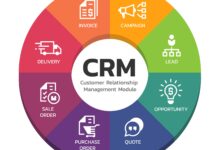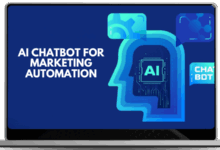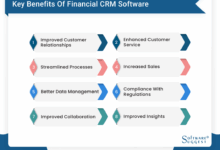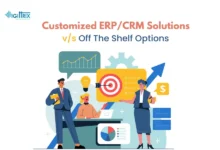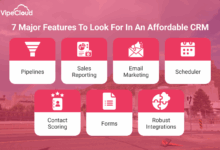AI-Powered CRM Software: Revolutionizing Customer Relationship Management
With AI-Powered CRM Software at the forefront, businesses are entering a new era of customer relationship management, where personalized interactions and predictive analytics redefine the way companies engage with their clients.
This innovative technology not only streamlines processes but also enhances data security, integrates seamlessly with other systems, and provides valuable insights for informed decision-making.
Enhancing Customer Engagement with AI in CRM Systems
AI plays a crucial role in enhancing customer engagement within CRM systems by providing personalized interactions and predictive analytics. By leveraging AI technology, businesses can better understand customer behavior, preferences, and trends, leading to more effective communication and tailored solutions.
Personalized Customer Interactions
- AI-powered chatbots can engage with customers in real-time, offering personalized recommendations based on their preferences and past interactions.
- AI algorithms can analyze customer data to create targeted marketing campaigns, improving customer engagement and increasing conversion rates.
- AI can enable dynamic content personalization on websites and emails, enhancing the overall customer experience.
Predictive Customer Insights
- AI can analyze historical customer data to predict future behavior, enabling businesses to anticipate customer needs and offer proactive solutions.
- By utilizing machine learning algorithms, CRM systems can forecast customer trends and preferences, allowing for strategic decision-making and personalized engagements.
- AI-driven analytics can segment customers based on their behavior patterns, enabling targeted marketing efforts and improved customer retention strategies.
Implementing AI-Powered Chatbots for Customer Support
Integrating AI-powered chatbots into CRM systems for customer support involves several steps, including training the chatbots, setting up predefined responses, and ensuring seamless integration with existing support channels. Chatbots offer advantages such as 24/7 availability, instant responses, and the ability to handle multiple inquiries simultaneously, enhancing customer satisfaction and reducing response times.
Advantages of AI-Powered Chatbots
- Chatbots can provide real-time assistance to customers, resolving queries quickly and efficiently.
- AI-powered chatbots can handle a high volume of inquiries simultaneously, improving customer service scalability.
- By leveraging natural language processing, chatbots can engage in meaningful conversations with customers, enhancing the overall support experience.
Training Chatbots for Accuracy
- Provide chatbots with extensive training data to improve accuracy and response quality over time.
- Regularly update chatbot responses based on customer feedback and interaction patterns to ensure relevance and effectiveness.
- Utilize sentiment analysis to gauge customer satisfaction and refine chatbot responses accordingly for a more personalized experience.
Leveraging AI for Sales Forecasting and Lead Management
AI algorithms can revolutionize sales forecasting and lead management in CRM systems by analyzing historical data, identifying patterns, and predicting future trends. By utilizing AI models, businesses can make data-driven decisions, prioritize leads effectively, and optimize sales strategies for improved conversion rates and revenue growth.
Benefits of AI in Sales Forecasting
- AI can analyze large datasets to identify sales trends and patterns, enabling accurate forecasting and strategic planning.
- By automating lead scoring processes, AI can prioritize high-quality leads and optimize sales team productivity.
- AI-powered predictive analytics can provide real-time insights into sales performance, empowering businesses to adapt quickly to market changes.
Setting up AI Models for Sales Predictions
- Train AI models with historical sales data to predict future trends and identify potential opportunities for growth.
- Utilize machine learning algorithms to analyze customer behavior and purchasing patterns, enabling personalized sales strategies.
- Implement AI-driven lead scoring mechanisms to categorize leads based on their likelihood to convert, streamlining the sales process and increasing efficiency.
Enhancing Data Security in AI-Powered CRM Systems
When implementing AI in CRM systems, data security is paramount to protect sensitive customer information and prevent unauthorized access. By following best practices, leveraging AI technologies for data encryption, and ensuring compliance with data privacy regulations, businesses can enhance data security measures and build trust with their customers.
Importance of Data Security Measures
- Implement robust encryption techniques to safeguard customer data and prevent data breaches.
- Regularly update security protocols and conduct vulnerability assessments to identify and address potential risks proactively.
- Utilize AI-powered anomaly detection systems to monitor data access and identify suspicious activities in real-time for enhanced security.
Features of AI-Powered CRM Software
AI-Powered CRM software comes equipped with a range of features that leverage artificial intelligence to enhance customer relationship management. These features streamline processes, improve data accuracy, and boost overall efficiency.
Data Management Optimization
AI technology plays a crucial role in improving data management within CRM systems. By automatically capturing, storing, and analyzing vast amounts of customer data, AI-powered CRM software ensures that businesses have access to up-to-date and relevant information. This leads to more accurate insights and personalized interactions with customers.
Automation
One of the key features of AI-Powered CRM software is automation. This technology automates repetitive tasks such as data entry, lead scoring, scheduling follow-ups, and sending personalized messages. By automating these processes, AI-Powered CRM software frees up valuable time for sales and customer service teams to focus on building relationships and closing deals.
Implementation of AI in CRM
Integrating AI into CRM systems involves a strategic process to leverage AI algorithms for optimizing customer data analysis. This implementation brings numerous benefits but also comes with its own set of challenges and considerations.
Optimizing Customer Data Analysis with AI Algorithms
- AI algorithms can analyze large volumes of customer data in real-time, identifying patterns and trends that human analysis might overlook.
- Machine learning algorithms can segment customers based on their behavior, preferences, and interactions with the company, allowing for more personalized marketing strategies.
- Predictive analytics powered by AI can forecast customer behavior and preferences, helping businesses anticipate needs and tailor their offerings accordingly.
Challenges and Considerations in Implementing AI in CRM Software
- Data Quality: Ensuring that the data fed into AI algorithms is accurate and up-to-date is crucial for obtaining reliable insights.
- Integration Complexity: Integrating AI capabilities into existing CRM systems can be complex and require specialized technical expertise.
- Privacy and Ethical Concerns: Managing customer data ethically and ensuring compliance with data protection regulations are essential considerations in AI implementation.
- User Adoption: Training employees to use AI-powered CRM software effectively and gaining their trust in AI-generated insights can be a significant challenge.
Personalization and Customer Insights
AI-Powered CRM software revolutionizes personalized customer interactions by leveraging artificial intelligence to analyze vast amounts of customer data. This enables businesses to tailor their communication and offerings to individual customers, enhancing their overall experience.
Importance of AI in Providing Valuable Customer Insights
AI plays a crucial role in providing valuable customer insights by analyzing customer data in real-time. This allows businesses to understand customer preferences, behaviors, and trends, leading to more targeted marketing campaigns and personalized interactions.
- AI identifies patterns in customer data to predict future behavior and preferences.
- AI analyzes customer feedback across various channels to provide insights for improvement.
- AI segments customers based on their characteristics and behaviors, allowing for targeted marketing strategies.
- AI enables businesses to anticipate customer needs and provide proactive solutions.
Examples of AI Predicting Customer Behavior Based on Data Analysis
AI predicts customer behavior by analyzing data such as purchase history, browsing patterns, and interactions with the company. Here are some examples of how AI-powered CRM software predicts customer behavior:
AI predicts when a customer is likely to churn based on their decreasing engagement with the brand.
AI forecasts which products a customer is interested in based on their browsing history and previous purchases.
AI anticipates customer preferences by analyzing their interactions with personalized content and offers.
Automation and Workflow Efficiency
AI plays a crucial role in automating repetitive tasks within CRM processes, leading to enhanced workflow efficiency and improved customer management. By leveraging AI capabilities, businesses can streamline operations and focus on high-value tasks while reducing manual labor.
AI-Driven Task Automation
- AI automates routine tasks such as data entry, email responses, and appointment scheduling, saving time for employees to focus on more strategic activities.
- Automated workflows ensure timely follow-ups, reminders, and notifications, enhancing customer engagement and satisfaction.
Data Entry Automation
- AI algorithms can extract, classify, and organize data from various sources into CRM systems, eliminating manual data entry errors and improving data accuracy.
- Automated data entry processes enable real-time updates and synchronization across multiple platforms, ensuring up-to-date information for effective decision-making.
AI-Driven Chatbots for Customer Service
- AI-powered chatbots offer instant support to customers, addressing queries, resolving issues, and providing personalized assistance round the clock.
- Chatbots can handle a large volume of customer interactions simultaneously, reducing response times and enhancing overall customer experience.
Personalized Marketing Campaigns
- AI analyzes customer data, behavior patterns, and preferences to create targeted marketing campaigns tailored to individual needs, increasing engagement and conversions.
- Personalized recommendations and offers based on AI insights result in higher customer satisfaction and loyalty, driving revenue growth for businesses.
Predictive Analytics for Sales Forecasting
- AI algorithms analyze historical sales data, market trends, and customer behavior to predict future sales patterns, helping businesses make informed decisions and optimize their sales strategies.
- Predictive analytics enable accurate forecasting, inventory management, and sales projections, leading to improved revenue forecasting and business planning.
AI-Driven Automation vs. Traditional CRM Processes
- AI-driven automation offers speed, accuracy, and scalability in CRM operations, surpassing the limitations of manual processes and traditional CRM methods.
- Compared to traditional approaches, AI automations deliver personalized customer interactions, predictive insights, and streamlined workflows, resulting in enhanced efficiency and competitive advantage for businesses.
Data Security and Privacy
Data security and privacy are critical components of any CRM system, especially when AI is involved in processing vast amounts of customer data. AI plays a significant role in enhancing data security and privacy within CRM systems by implementing advanced encryption techniques, predictive analytics for identifying potential security threats, and real-time monitoring of data access.
Ensuring Secure Data Processing
- Implementing robust encryption methods to protect sensitive customer information stored in the CRM database.
- Utilizing AI algorithms to detect any suspicious activities or unauthorized access to customer data.
- Regularly updating security protocols and conducting security audits to identify and address potential vulnerabilities.
Challenges in Maintaining Data Privacy
- Balancing the need for personalized customer experiences with the protection of sensitive data.
- Ensuring compliance with data privacy regulations such as GDPR and CCPA while leveraging AI capabilities in CRM software.
- Managing data access permissions and restricting unauthorized users from viewing or manipulating customer data.
Strategies for Data Protection
- Implementing multi-factor authentication to prevent unauthorized access to the CRM system.
- Regularly training employees on data security best practices and the proper handling of customer data.
- Utilizing anonymization techniques to protect customer identities while still deriving valuable insights from the data.
Integration Capabilities with Other Systems
In today’s interconnected business environment, the ability of AI-Powered CRM software to seamlessly integrate with other systems is crucial for optimizing operations and enhancing overall efficiency. Let’s delve into how these integrations work and the benefits they bring to businesses.
Benefits of Integration with Other Systems
Integrating AI-Powered CRM software with other business systems such as marketing automation platforms, ERP systems, e-commerce platforms, and customer service tools offers a range of benefits:
- Streamlined Data Flow: Integration allows for the seamless flow of data between different systems, ensuring consistency and accuracy.
- Enhanced Communication: By connecting CRM with communication tools, teams can collaborate more effectively and provide personalized customer interactions.
- Improved Decision-Making: Access to integrated data from various systems enables better-informed decision-making processes.
Successful Integrations Examples
Successful integrations between AI-Powered CRM and other platforms include:
- Integration with Email Marketing Platforms: Automatically syncing customer data between CRM and email marketing platforms for targeted campaigns.
- Integration with Social Media Management Tools: Connecting CRM with social media tools to track customer interactions and sentiment.
- Integration with Help Desk Software: Seamless integration for a comprehensive view of customer interactions and issue resolution.
Setting Up Integrations with AI-Powered CRM
The process of setting up integrations with AI-Powered CRM software typically involves:
- Identifying the systems to be integrated based on business needs.
- Configuring integration settings within the CRM platform.
- Testing the integration to ensure data accuracy and functionality.
Key Considerations for Integration Selection
When choosing systems to integrate with AI-Powered CRM, key considerations include:
The compatibility of systems in terms of data formats and API support.
The scalability and flexibility of the integration for future business growth.
The security measures in place to protect data during integration processes.
Comparison Table of Integration Options
| Integration Option | Features | Compatibility |
|---|---|---|
| Email Marketing Platforms | Automated email campaigns | High |
| Social Media Management Tools | Customer sentiment analysis | Medium |
| Help Desk Software | Issue tracking and resolution | High |
Troubleshooting Integration Issues with AI-Powered CRM
To troubleshoot common integration issues with AI-Powered CRM software, follow these steps:
- Check data mapping and ensure correct field mapping between systems.
- Review API keys and authentication settings for proper access.
- Monitor system logs for error messages and investigate accordingly.
Customer Relationship Enhancement
AI technology plays a crucial role in enhancing customer relationships through CRM software by leveraging customer data to personalize interactions and anticipate their needs. By analyzing customer behavior patterns and preferences, AI-powered CRM systems can tailor communication and offerings, leading to a more personalized and engaging customer experience.
Real-Time Support Through Chatbots and Virtual Assistants
AI in CRM software enables businesses to provide real-time support to customers through chatbots and virtual assistants. These AI-driven tools can efficiently address customer queries, provide product recommendations, and offer assistance round the clock, enhancing customer engagement and satisfaction.
- Chatbots can handle a high volume of customer inquiries simultaneously, providing instant responses and solutions.
- Virtual assistants can offer personalized recommendations based on customer preferences, driving higher customer satisfaction and loyalty.
Examples of AI Applications for Customer Relationship Strengthening
AI applications such as recommendation systems, sentiment analysis tools, and personalized marketing campaigns are instrumental in strengthening customer relationships. These tools leverage AI algorithms to analyze customer data and behavior, allowing businesses to deliver targeted and relevant interactions.
For instance, recommendation systems use AI to suggest products or services based on a customer’s past purchases or browsing history, increasing the likelihood of a purchase.
Tracking Customer Interactions Across Channels
AI helps businesses track customer interactions across various channels, ensuring a seamless and consistent experience for customers. By integrating data from different touchpoints, businesses can gain a comprehensive view of customer preferences and behaviors, enabling them to deliver personalized and timely interactions.
- AI-driven CRM systems can track customer interactions on social media, email, websites, and mobile apps, providing a holistic view of customer engagement.
- This consolidated data allows businesses to better understand customer needs and preferences, leading to more targeted marketing strategies and improved customer retention.
Scalability and Customization
When it comes to AI-Powered CRM software, scalability and customization play crucial roles in meeting the evolving needs of businesses. Let’s delve into how these aspects are addressed in AI-enhanced CRM solutions.
Scalability Support
AI-Powered CRM software is designed to grow alongside businesses, offering scalability features that can adapt to increasing data volumes and expanding operations. As companies expand their customer base and interactions, AI algorithms can handle large datasets efficiently, ensuring smooth performance without compromising on speed or accuracy.
Customization Importance
Customization options in AI-enhanced CRM solutions are essential for tailoring the system to meet specific business requirements. By allowing users to personalize workflows, reporting, and analytics based on their unique needs, AI empowers organizations to create a more tailored and efficient CRM experience. This level of customization enhances user adoption and overall productivity.
Tailored CRM Experiences
- AI enables personalized customer interactions by analyzing individual preferences and behavior patterns. This allows businesses to create targeted marketing campaigns and offer relevant product recommendations, enhancing customer engagement and satisfaction.
- Custom AI models can be built to address specific industry challenges or business objectives, such as predicting customer churn or optimizing sales processes. These tailored solutions ensure that the CRM system aligns with the organization’s strategic goals.
- Through AI-driven insights, businesses can segment their customer base effectively and deliver personalized communication across different channels. This level of customization fosters stronger relationships and loyalty among customers.
Analytics and Reporting
AI plays a crucial role in enhancing data analytics and reporting capabilities within CRM systems by leveraging advanced algorithms and machine learning techniques. By analyzing vast amounts of customer data, AI can generate valuable insights that drive strategic decision-making processes and improve overall customer engagement.
AI-driven Data Insights
- AI algorithms can sift through large datasets to segment and categorize customer information, enabling targeted marketing campaigns and personalized communication strategies.
- Through predictive analytics, AI can forecast customer behavior and preferences based on historical patterns, allowing businesses to anticipate and fulfill customer needs effectively.
- AI-powered predictive analytics significantly impact sales forecasting accuracy and customer engagement metrics, leading to better decision-making and resource allocation.
Comparison with Traditional Reporting
- AI-driven reporting surpasses traditional methods in terms of speed, accuracy, and scalability, providing real-time insights and actionable recommendations for improved business outcomes.
Key Metrics Tracked by AI in CRM Systems
- AI can track and analyze key metrics such as customer satisfaction scores, retention rates, purchase patterns, and customer lifetime value to enhance overall customer relationship management.
User Experience and Interface
AI technology plays a crucial role in personalizing user experiences in e-commerce platforms, optimizing website interfaces for better customer engagement, and enhancing overall user interface design in online retail websites.
Personalization of User Experiences
AI algorithms can analyze user behavior, preferences, and purchase history to create personalized recommendations and tailored shopping experiences. By leveraging machine learning, e-commerce platforms can offer product suggestions, personalized promotions, and customized content based on individual user data.
-
For example, Amazon uses AI-powered recommendation engines to suggest products based on past purchases, browsing history, and demographic information, enhancing the overall shopping experience for users.
-
Retailers like Sephora use AI chatbots to provide personalized beauty recommendations, skincare tips, and product suggestions to customers, creating a more engaging and interactive shopping experience.
Optimizing Website Interfaces
AI technologies such as natural language processing (NLP) and image recognition can optimize website interfaces by improving search functionalities, enhancing product visualization, and streamlining the checkout process. By analyzing user interactions and feedback, AI can help retailers design user-friendly interfaces that drive conversions and increase customer satisfaction.
-
AI-powered chatbots like those from Nordstrom can assist customers in finding products, answering queries, and providing real-time support, enhancing the overall user experience on the website.
-
Visual search tools powered by AI, such as the one offered by ASOS, allow users to search for products using images, making the shopping experience more intuitive and user-friendly.
Training and Support for AI-Powered CRM
Training employees to effectively use AI-Powered CRM software is crucial for maximizing the benefits of this technology within CRM systems. Without proper training, employees may not fully understand how to leverage AI capabilities to enhance customer engagement and streamline operations.
Importance of Training
Training employees on how to use AI-Powered CRM software effectively ensures that they can make the most out of the technology. It helps them understand how AI algorithms work, how to interpret customer insights generated by AI, and how to use automation features to improve workflow efficiency.
Role of Ongoing Support and Updates
Ongoing support and updates play a key role in maximizing the benefits of AI within CRM systems. Regular updates ensure that the software is up-to-date with the latest AI advancements and features, while continuous support helps address any issues or challenges that employees may face while using the software.
Tips for Successful Adoption
- Provide comprehensive training programs for employees at all levels of the organization to ensure everyone is equipped with the necessary skills to use AI-Powered CRM effectively.
- Encourage continuous learning and upskilling to keep employees informed about new AI capabilities and features.
- Offer ongoing support through help desks, tutorials, and dedicated AI experts to assist employees with any questions or challenges they encounter.
- Gather feedback from employees regularly to identify areas for improvement and enhance the user experience of the AI-Powered CRM software.
- Stay updated with the latest trends and best practices in AI technology to ensure that your CRM system remains competitive and efficient.
Industry Applications and Case Studies
AI-powered CRM software has found its way into various industries, revolutionizing customer relationship management and enhancing business outcomes. Let’s explore some industry applications and case studies that highlight the impact of AI in CRM across different sectors.
Retail Sector
AI plays a crucial role in improving sales forecasting and customer retention strategies in the retail sector. By analyzing customer data and behavior patterns, AI-powered CRM systems can help retailers anticipate demand, personalize marketing strategies, and enhance overall customer experience.
Healthcare Industry
In the healthcare industry, AI-powered CRM tools are transforming patient engagement and personalized care. Through advanced data analysis and predictive modeling, healthcare providers can deliver tailored treatment plans, improve patient outcomes, and optimize operational efficiency.
E-commerce Sector
AI is optimizing marketing campaigns and lead generation efforts in the e-commerce industry. By leveraging AI algorithms to analyze customer preferences and purchase history, e-commerce businesses can target the right audience, recommend personalized products, and drive sales growth.
Financial Services
AI is reshaping the financial services sector by enabling intelligent data analysis and personalized customer interactions. From fraud detection to personalized financial advice, AI-powered CRM solutions help financial institutions enhance customer satisfaction, streamline operations, and drive revenue growth.
Hospitality Industry
In the hospitality industry, AI applications in CRM are improving customer service and loyalty programs. By analyzing guest feedback, preferences, and booking patterns, hotels and resorts can tailor personalized experiences, optimize pricing strategies, and strengthen customer loyalty.
Cross-Industry Comparison
A table comparing the key features and benefits of AI-powered CRM solutions across different industries would provide a comprehensive overview of how AI is driving innovation and transforming customer relationships in traditional and emerging sectors.
Future Trends and Innovations
AI-Powered CRM software is expected to undergo significant evolution in the next five years, with several key features and functionalities becoming standard across platforms. The integration of advanced technologies such as natural language processing (NLP), sentiment analysis, and machine learning algorithms will revolutionize customer interactions, personalization, and automation within CRM systems. Furthermore, the potential incorporation of virtual reality (VR) and augmented reality (AR) technologies is set to enhance the overall CRM experience for both businesses and customers.
Impact of Natural Language Processing and Sentiment Analysis
Natural language processing (NLP) and sentiment analysis will play a crucial role in transforming customer interactions within CRM systems. By analyzing and understanding customer language patterns and sentiment, AI-powered CRM software can provide more personalized and contextually relevant responses, leading to improved customer satisfaction and loyalty.
Personalized Customer Experiences
- AI-driven CRM solutions can enable businesses to deliver hyper-personalized customer experiences by leveraging data insights and predictive analytics.
- For example, AI algorithms can analyze customer preferences, behavior, and past interactions to recommend tailored products or services, leading to higher conversion rates and customer engagement.
Automation of Sales Forecasting and Customer Segmentation
- Machine learning algorithms will increasingly automate sales forecasting and customer segmentation processes within CRM platforms.
- By analyzing historical data, purchase patterns, and customer demographics, AI-powered CRM software can accurately predict sales trends, identify high-value customers, and optimize marketing strategies for better ROI.
Integration of Virtual Reality and Augmented Reality
The potential integration of virtual reality (VR) and augmented reality (AR) technologies in CRM processes opens up new opportunities for immersive customer experiences and enhanced product visualization.
Ethical Considerations in AI-Powered CRM
Ethical considerations play a crucial role in the adoption and utilization of AI in customer relationship management. As businesses leverage AI-powered CRM software to enhance customer interactions and streamline processes, it is essential to address the ethical implications associated with these technologies.
Transparency and Accountability in AI Algorithms
Ensuring transparency and accountability in AI algorithms within CRM systems is paramount. Businesses must be able to explain how AI algorithms make decisions and provide clear insights into the data and processes involved. By promoting transparency, organizations can build trust with customers and stakeholders, fostering a more ethical approach to AI implementation.
Guidance on Ethical Practices
– Implement clear guidelines and policies for the ethical use of AI in CRM systems.
– Regularly audit and monitor AI algorithms to identify and address biases or discriminatory practices.
– Obtain explicit consent from customers regarding the use of their data for AI-driven insights.
– Prioritize data privacy and security to protect sensitive customer information.
– Provide ongoing training and education for employees on ethical AI practices and compliance with regulations.
Accountability and Fairness
– Hold businesses accountable for the decisions made by AI algorithms and ensure mechanisms are in place to rectify any errors or biases.
– Ensure fairness in the treatment of customers by AI systems, avoiding discrimination based on factors like race, gender, or socioeconomic status.
– Establish clear processes for handling customer complaints or concerns related to AI-powered CRM interactions.
Mitigating Risks and Ensuring Compliance
– Conduct regular risk assessments to identify potential ethical issues in AI-powered CRM systems.
– Comply with relevant regulations and standards governing the use of AI in customer relationship management.
– Collaborate with ethical AI experts and stakeholders to address emerging ethical challenges in CRM technology.
Conclusive Thoughts
In conclusion, AI-Powered CRM Software is a game-changer in the business landscape, offering unparalleled capabilities in customer engagement, sales forecasting, data security, and more. Embracing this technology is key to staying competitive and meeting evolving customer expectations.
